The year might be drawing to a close, but it’s a perfect time to do something new with your Japanese study! Take a look below at the latest list of Japanese learning resources, lovingly selected by our team, to help supercharge your Japanese study.
Activate Your Japanese!

Activate Your Japanese! is a 24-episode drama about a Vietnamese girl named Xuan who came to Japan to work in a hotel. It comes from Japan’s national broadcasting network, known as NHK, which is known for producing quality video content about all sorts of topics. You can think of them as the BBC or CNN of Japan. In the drama, she encounters a sentient keychain, new friends, and lots of new Japanese. And as with any drama, there are elements of humor and romance that really make it entertaining.
Each video is divided into parts: The main skit, Today’s Strategy, Onomatopoeia, and Welcome to My Japan. The main skit follows Xuan and her time adjusting to Japanese life, all while providing useful communication strategies. Next, the Today’s Strategy section focuses on a useful communication strategy or phrase that Xuan utilized in the main skit. Plenty of examples are provided, making this part of each video particularly useful for learners. Then comes the Onomatopoeia bit, which introduces a common Japanese onomatopoeia. Again, several examples are provided to help reinforce how the word is used in real life. And finally, the Welcome to My Japan bit finishes off each video with a presentation of someone’s life after coming to Japan. Many of these individuals immigrated to Japan for work and have lived in the country for several years. Their work, interests, and hobbies are highlighted in this section.
Every video in this series comes with translated captions and even a transcript, making it ideal for learners at level who want to practice reading or listening skills. But even if learning Japanese is not your main goal, the series can still be enjoyed purely as a drama for one’s own entertainment. According to the site, this series will be available until 2027, so there’s plenty of time to go through each of the 15-minute episodes.
Beyond Activate Your Japanese!, the NHK has a number of other resources for Japanese learners, like the Essential Japanese section, which provides survival phrases, and Easy Japanese: Conversation Lessons, which contains lots of learning content related to conversation practice. There’s something for everyone, so check it out!
あかね的日本語教室
あかね的日本語教室, otherwise known as Akane’s Japanese Class, is a popular YouTube channel produced by a Japanese teacher named Akane. This channel is targeted towards intermediate and advanced learners. However, Akane mentions that this channel is also accessible to beginners who want a bit of a challenge. The difficulty comes from all the videos being entirely in Japanese. The subtitles at the bottom of the screen are in Japanese, and include furigana over more difficult kanji. There are also closed captioning subtitles that can be turned off and on, with an impressive number of languages covered — 15!
The videos on this channel are very educational while also entertaining. The topics surround learning Japanese, travel around Japan, everyday life in Japan, and more. An example of Akane’s videos that Japanese learners may find most useful are “[Business Japanese] Basics of telephone correspondence” and several interviews with non-native speakers living in Japan and studying the language. Each video lasts about 10-15 minutes in length, and they go by quickly. Because Akane speaks slowly, it’s easy to follow the dialogue. If you’re looking for even more content by Akane, you can also check out the podcast and Instagram page she also has.
Japanese Immersion with Asami
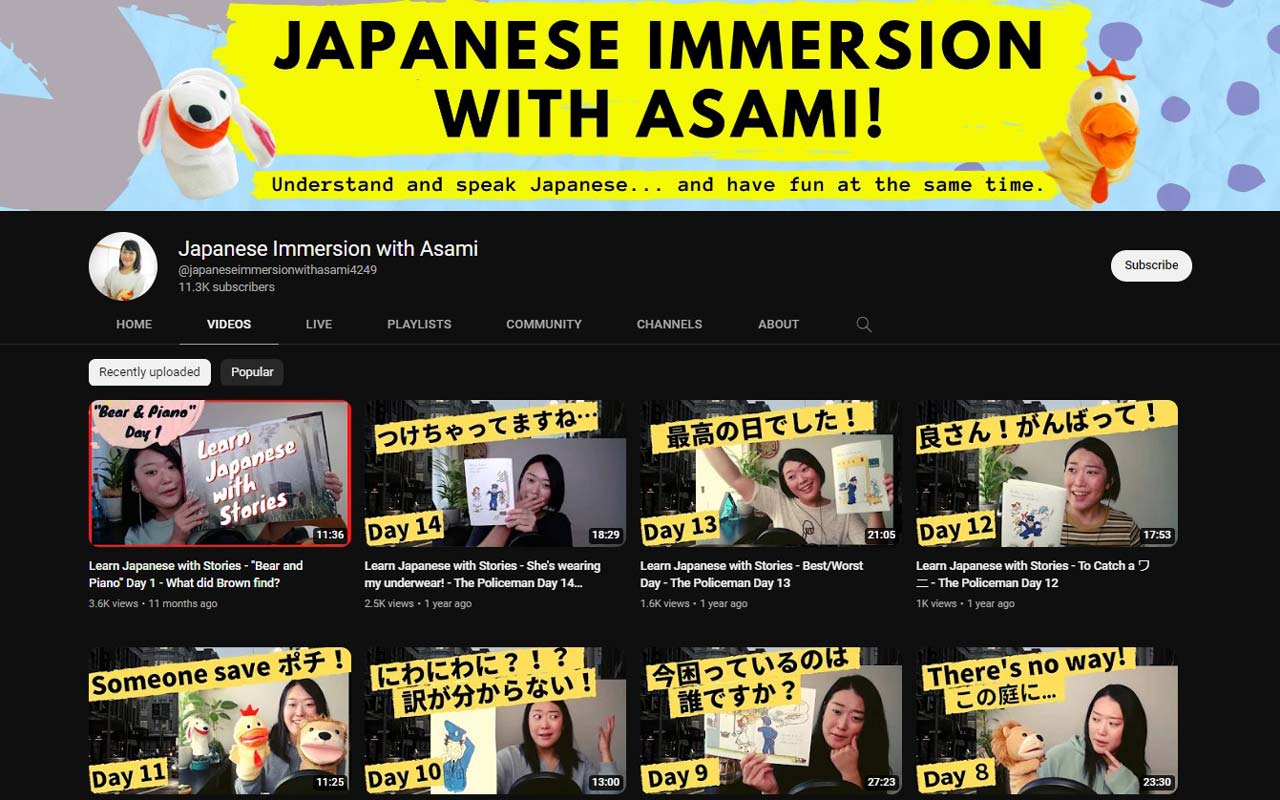
Japanese Immersion with Asami is a YouTube channel that, as the name suggests, focuses on teaching via comprehensible input; that is, Japanese made as easy to understand as possible, even for beginners, without relying on English explanations or translations. Asami has been a Japanese teacher since 2015, and with her trusty partner Hyougen, mostly reads stories in her videos, with helpful explanations and commentary; all in Japanese.
The videos are a great way to get your feet wet engaging with Japanese media more, without feeling like you’re alone in the endeavor. In fact, the casual, supportive atmosphere of her videos might be their best feature; it really does feel like a private lesson. And with several series in a variety of genres and titles, such as Kiki’s Delivery Service and short stories, you’re sure to find a narrative that piques your interest.
日本語表現インフォ
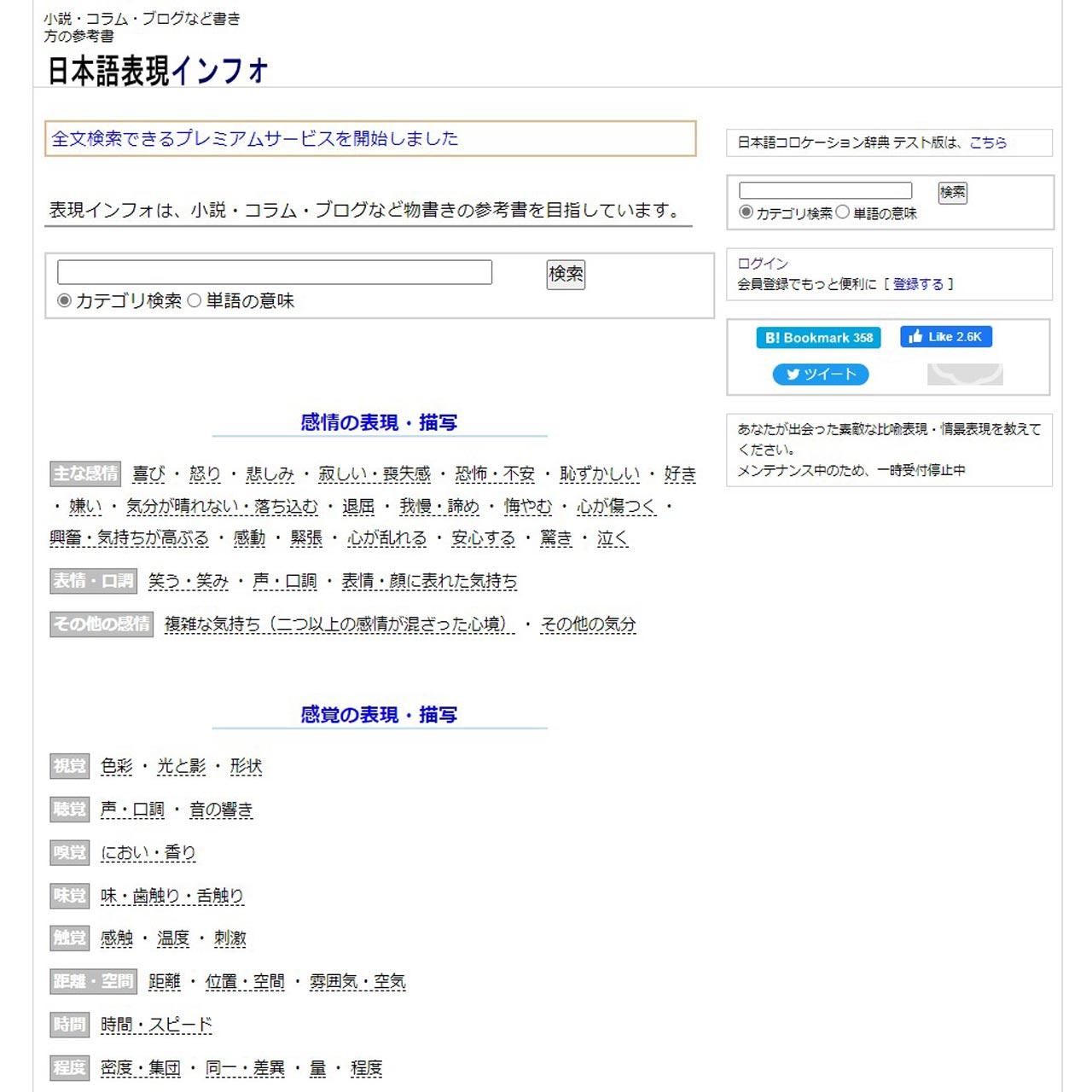
One of the most difficult parts of learning another language can be expressions. As language conveys culture, each individual language has different expressions relevant to its own culture, and translating between them is no easy task. Thankfully for Japanese learners, there’s the helpful website 日本語表現インフォ, or “Japanese Expression Info” to make things a little easier.
The site is very straightforward, with various expressions grouped into different categories, like expressions conveying emotions, sensations, or people, for example. From there they’re often broken down even further, like expressions relevant to conveying different degrees of sadness.
While the website states the intent was to be a resource for people aiming to write in Japanese, it’s helpful for Japanese learners as well. Not only will using these sorts of expressions add a sense of naturalness to your own writing, but they might help you while reading Japanese. 日本語表現インフォ is a great resource for learning both Japanese language and culture.
Sail
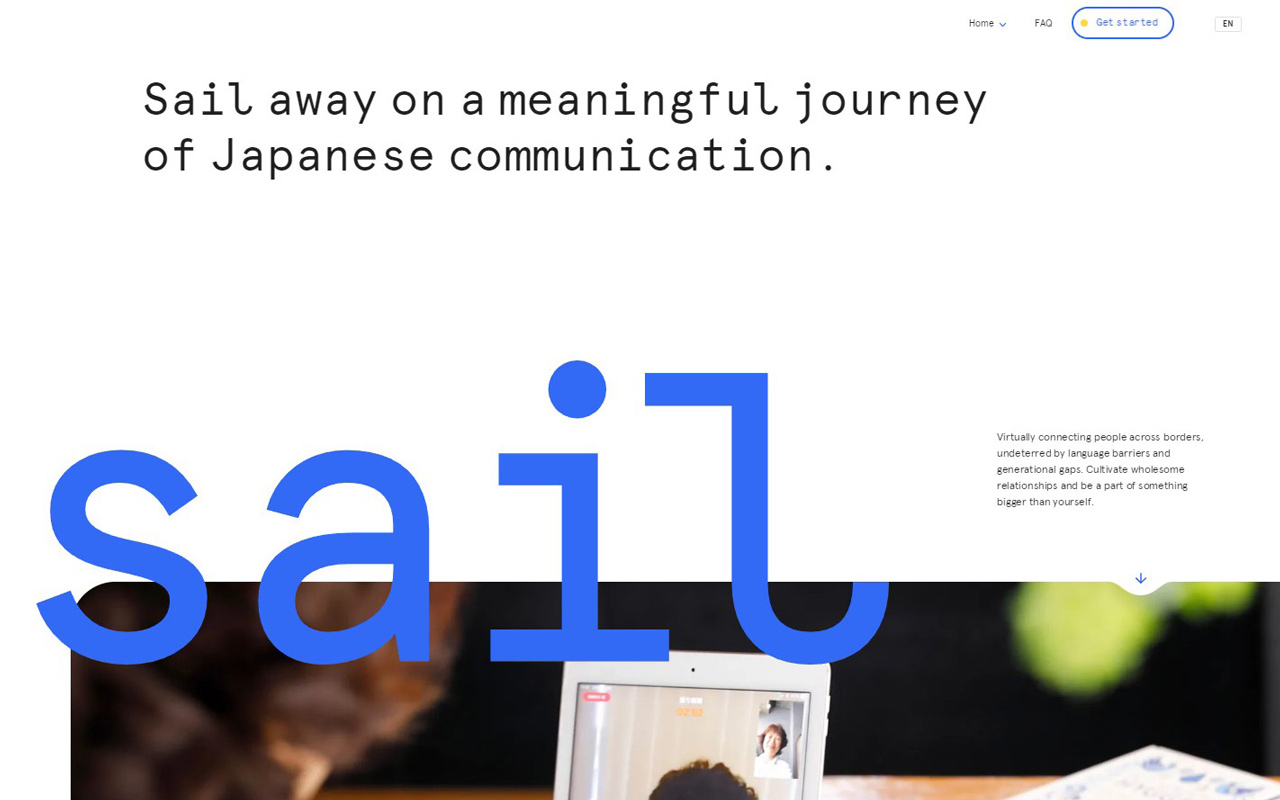
Sail is a unique approach to Japanese language exchange apps. Available on iOS and Android, Japanese learners first register for an account, filling out some of their interests and a basic self-introduction. But rather than connect with teachers or other language learners, Sail connects you to native Japanese speakers in the form of retirees and senior citizens. Like all similar apps, you’re able to look at the profiles of various exchange partners, and find someone who might be a good fit in terms of interests and availability. Conversations are set to last 25 minutes, offering a contained experience: long enough that you’re able to actually chat, but not so long that you might run out of steam.
It’s a unique concept, and one that works well. Older people make good conversation partners, and are often very cordial and have a lot of free time. They’re excited to get the chance to connect to learners, and share something of their language and culture, and this eagerness is contagious. What’s even better is that Sail allows for unlimited conversations for a simple fee of $14.90 a month, with discounts at longer terms. This makes Sail one of the best bangs for your buck for Japanese learners hoping to converse.
パパパパパピィ
Update: Sadly this resource is no longer available.
Do you miss the good ol’ days of reading picture books as a kid? Would you like to know more about Japanese children’s books and the colorful images and themes they have inside? With the YouTube channel パパパパパピィ, you can read along, in a bedtime story fashion, to many different Japanese children’s books.
Each story is read front to back by the host of the channel, who keeps you engaged with different voices and sounds, depending on the character or noise. You’ll be able to follow along with the script, as the pages are shown while being narrated. Picture books are a great resource for beginner learners, as they don’t have as many kanji. The readings are very short, witheach video being under ten minutes long. Whether you’re looking to find more resources for your kids, or you’re wanting to bring back the nostalgia of reading children’s books, give this channel a go and watch how you’re instantly transported to the land of cheery Japanese stories!
Megumi’s Daily Japanese Adventures
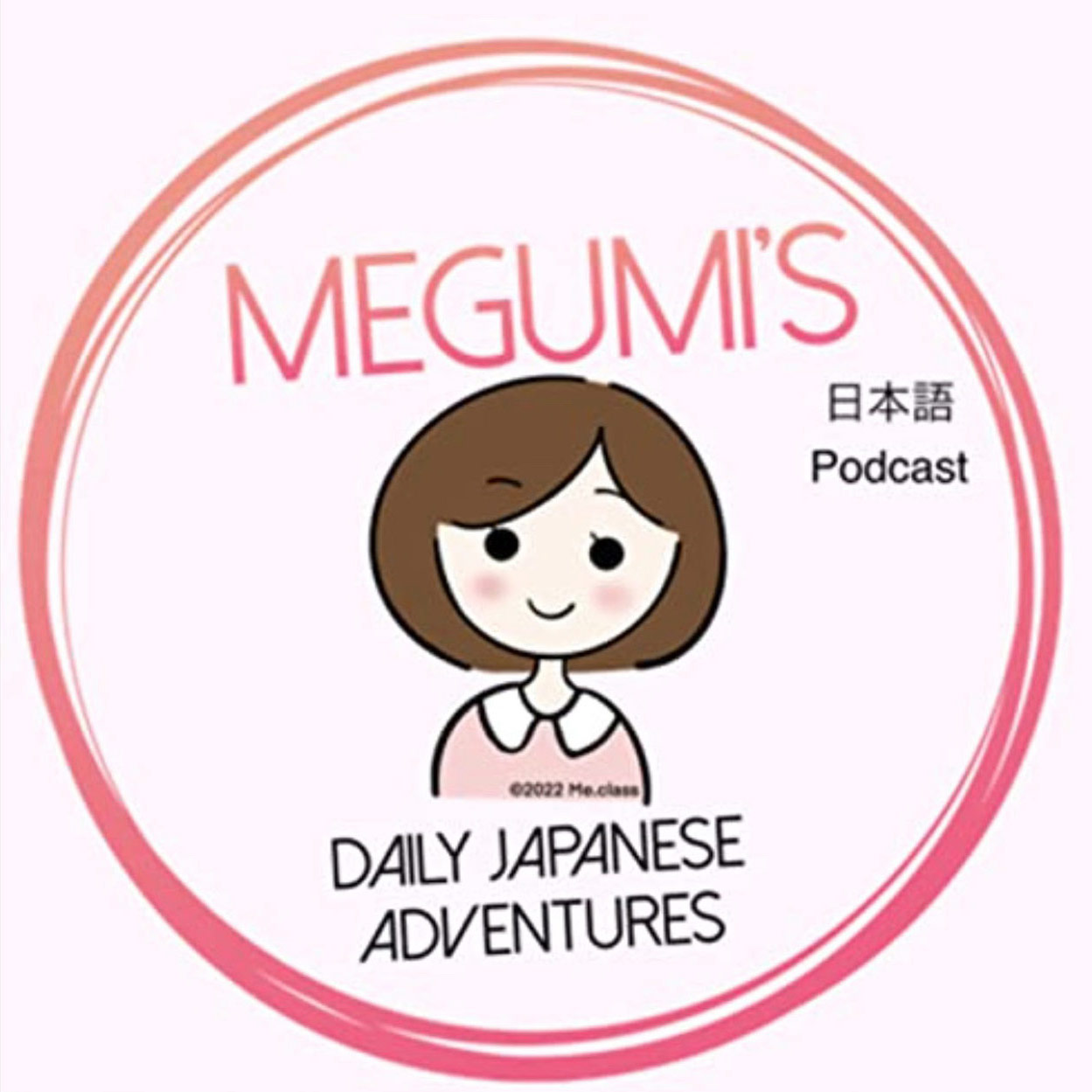
If you’re wanting to get more listening practice in, the podcast Megumi’s Daily Japanese Adventures could be the right fit for you. This podcast was created for Japanese learners and could be used somewhat similarly to JLPT listening practice. In this podcast, the host, Megumi, talks about various experiences she’s had related to travel, Japanese culture, and more. The way Megumi describes these adventures is story-like, with background music to accompany her anecdotes and detailed accounts. She speaks slowly and clearly, which is good for those who are just beginning to listen to content that’s entirely in Japanese. The targeted audience for this podcast is around the intermediate level.
For listeners who would like to follow along with the dialogue, there are also transcripts on Megumi’s website. At the end of these transcripts, there are English translations for some of the more advanced vocabulary. The episodes are around 5 minutes in length, so they’re quick listens if you want to give them a go.
Human Japanese
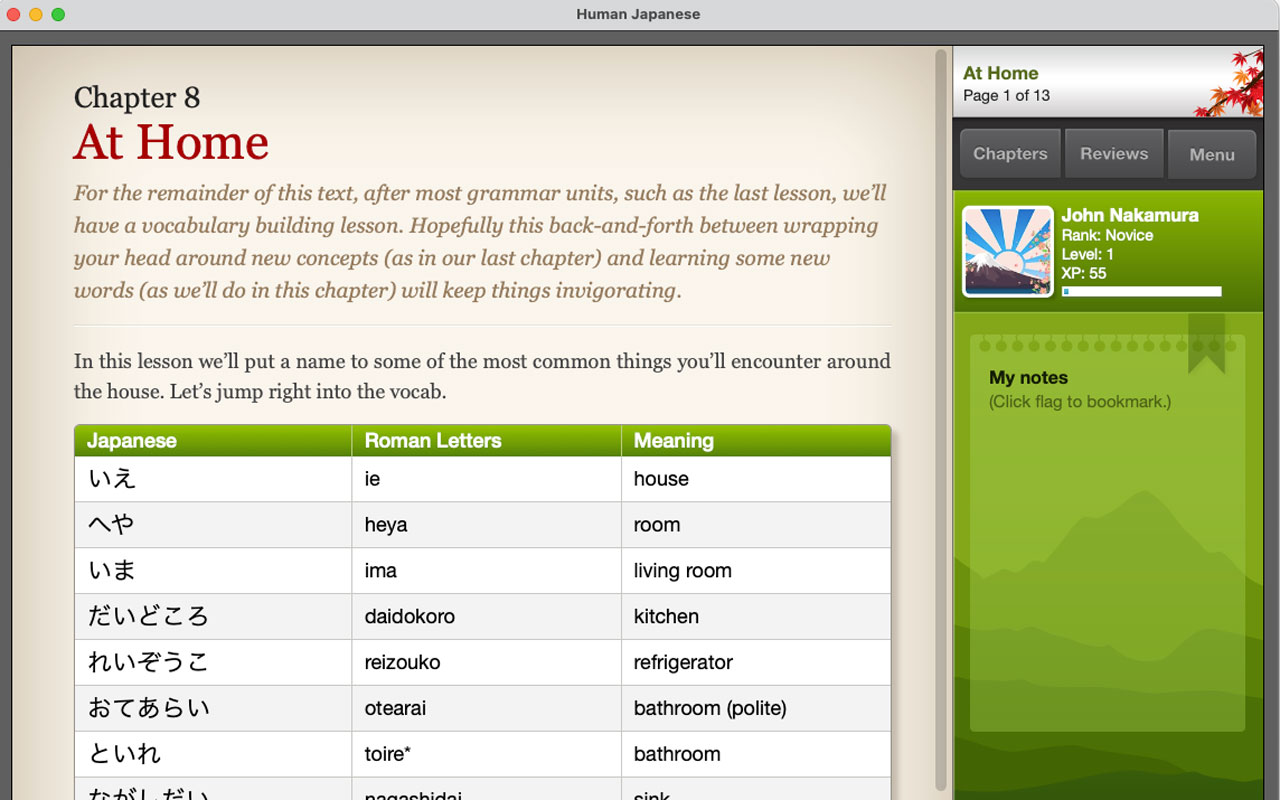
Made by the same people who brought us Satori Reader, the Human Japanese apps are basically digital textbooks for Japanese, or as they call it, your “personal sensei in a box.” There is an app for beginners and then an intermediate-level version. The beginner version boasts over 500 pages of content and around 800 example sentences, with breakdowns of each word and particle to boot! When teaching kana and kanji, there are stroke order animations, and plenty of example words as well.
The lessons in this app are truly worded and organized like a textbook. You will find lessons related to food, school, geography, health, work, and the weather. Major grammar points are included as well, including lessons on verbs, adjectives, adverbs, conjugations, counting, particles, and more. At the end of each lesson, you can find review quizzes. By default, you cannot move on to the next chapter until you have passed a chapter review quiz, but you can change this in the settings.
The overall design of the app is sleek and nice, but can feel a little dated to some seeing as it was originally created over a decade ago. Some pages are a little intimidating because of their word count, which some may find annoying. And there are no romaji to help you out; the app assumes you will learn hiragana and katakana. So if this kind of electronic textbook is just what you’re looking for, then Human Japanese may be for you. For readers looking to give it a try, they offer a lite version free of charge.
YomuJP
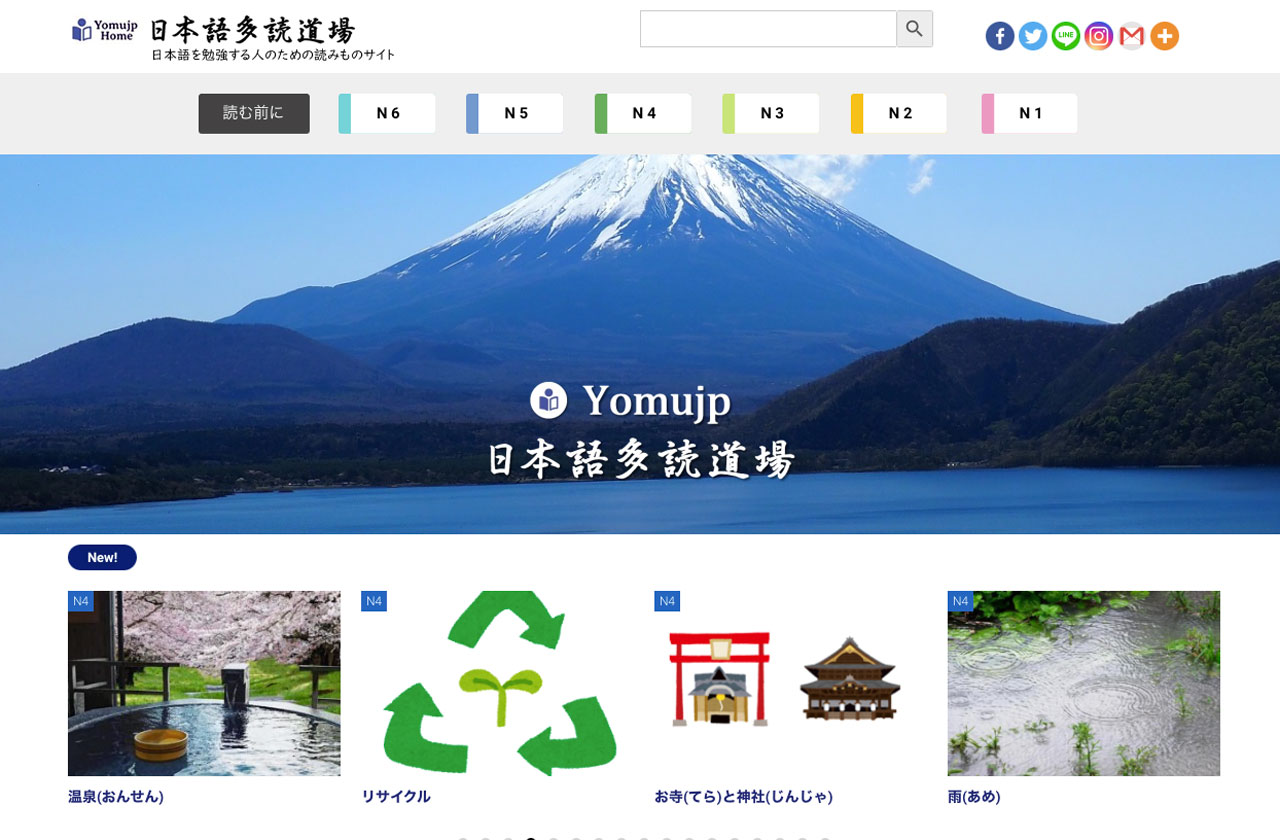
For the Japanese graded reader junkies out there looking for more material, you might want to check out YomuJP. This website is dedicated to providing Japanese learners with easy, level-appropriate reading content in a simple layout.
There are tons of writings in their database. Each article contains pictures, and even audio recordings of a native speaker reading the material. This means you can use this site for listening practice as well. The stories are separated by reading difficulty. There are six categories, from N6 to N1, with N6 being the easiest (introductory level Japanese) and N1 being the hardest (advanced Japanese). According to the site, this scale is based on the Japanese Language Proficiency Test (JLPT) with N6 being an even easier level than the JLPT’s lowest level of N5. You can browse articles by difficulty level or by tag.
The site also regularly posts to their Twitter page, often highlighting articles. New articles seem to be consistently released as well. If you are interested in practicing your reading (or listening) skills, or if you are thinking of studying for the JLPT, then consider YomuJP as one handy-dandy tool in your toolbox.
Thanks so much for following along with us to the end of the year, and the end of the article! We hope it’s been a helpful journey. From all of us at Tofugu, hope you have a relaxing 正月, and spring is right around the corner.




